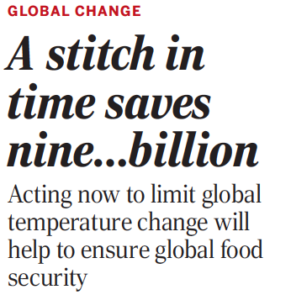Dr. William W.L. Cheung, REGIMES Scientific Advisory Board member and Associate Professor at the University of British Columbia’s Changing Ocean Research Unit and Director of Science of the NF-UBC Nereus Program, published a new article in the journal Science 23 December 2016. Dr. Cheung, with colleagues Gabriel Reygondeau from UBC and Thomas Frölicher from ETH Zürich project climate-risk indicators for marine fisheries under the 1.5 degree Celcius climate target of the Paris Agreement of 2016. Cheung et al. show the benefits of sticking to this target, especially in the Arctic and Indo-Pacific regions of the Ocean.
In a commentary to this paper also in Science 23 December 2016, Dr. Beth Fulton of CSIRO and the Centre for Marine Socioecology, University of Tasmania, writes:
“The work [of Cheung et al.] is an important addition to the discussion of the costs and benefits of keeping the average global temperature rise to less than 2°C. A temperature change of 2°C does not seem like a lot, especially given much wider daily temperature ranges in many locations. How ever, in terms of global mean temperature, it marks a point where climate change would have broad-scale effects on many locations and aspects of life, ultimately leading to a less productive world with reduced capacity to support basic human needs. This was the motivation for the Paris Agreement, adopted by consensus on 12 December 2015 and ratified on 4 November 2016. The aims at the heart of this agreement highlight the basic tension in today’s public policy decision-making: how to achieve economic development, meet basic human needs, and limit environmental impacts as the global population grows toward 9 billion by 2050.”
ever, in terms of global mean temperature, it marks a point where climate change would have broad-scale effects on many locations and aspects of life, ultimately leading to a less productive world with reduced capacity to support basic human needs. This was the motivation for the Paris Agreement, adopted by consensus on 12 December 2015 and ratified on 4 November 2016. The aims at the heart of this agreement highlight the basic tension in today’s public policy decision-making: how to achieve economic development, meet basic human needs, and limit environmental impacts as the global population grows toward 9 billion by 2050.”
This paper and the underlying analyses will be used in future REGIMES work to determine how climate change will effect ecosystems services around Svalbard in the future. We will integrate these and other projections with new narratives of climate services and governance regimes for Norway in an experimental dialogue framework with three generations of Norwegians. We look forward to new exciting REGIMES activities in 2017!
Congratulations to William!